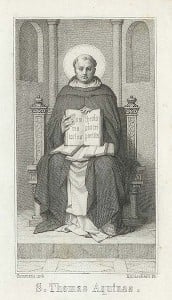 We’re blogging through St. Thomas Aquinas’ Compendium Theologiae, sometimes called his Shorter Summa. Find the previous posts here.
We’re blogging through St. Thomas Aquinas’ Compendium Theologiae, sometimes called his Shorter Summa. Find the previous posts here.
Every Sunday when we recite the Creed at Mass we say that the Holy Spirit proceeds “from the Father and the Son”. In the early Church there was considerable controversy regarding the nature of the Trinity; the Arians, for example, held that the Son was not divine but was simply the highest of all creatures. Others held that the Holy Spirit was a kind of creation of the Son. Most of this was ironed out by the time of the Council of Nicaea; the Fathers of the Church were clear that both the Son and the Holy Spirit are truly divine: the Son is begotten by the Father, and the Holy Spirit proceeds (in some fashion other than creation) from the Father and the Son.*
In this chapter Thomas explains the procession of the Holy Spirit in terms of the actions of the intellect and the will. It’s complicated to read, but it’s not that difficult to understand. Go ahead and skim the following:
We should recall that the act of understanding proceeds from the intellectual power of the mind. When the intellect actually understands, the object it understands is in it. The presence of the object known in the knower results from the intellectual power of the mind, and is its word, as we said above. Likewise, what is loved is in the lover, when it is actually loved. The fact that an object is actually loved, results from the lover’s power to love and from the lovable good as actually known. Accordingly the presence of the beloved object in the lover is brought about by two factors: the appetitive principle and the intelligible object as apprehended, that is, the word conceived about the lovable object.
In short, I love what I know to be good: loving always involves knowing. The love flows from the lover because of the lover’s knowledge. The lover is the Father; the lover’s knowledge is the Son; and the beloved, the Spirit, thus depends on both.
Therefore, since the Word in God who knows and loves Himself is the Son, and since He to whom the Word belongs is the Father of the Word, as is clear from our exposition, the necessary consequence is that the Holy Spirit, who pertains to the love whereby God is in Himself as beloved in lover, proceeds from the Father and the Son. And so we say in the Creed: “Who proceeds from the Father and the Son.”
____
* Why no, I’m not going to get into the filioque controversy.
photo credit: Public Domain; source Wikimedia Commons












